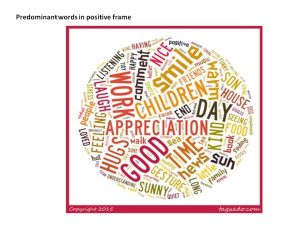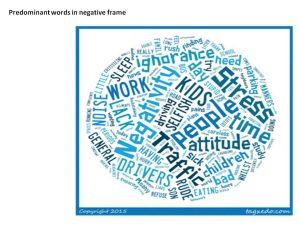43
Marie Briguglio, University of Malta, Malta
Two questions, twenty four hours, three hundred and sixty comments, a handful of insights and one conclusion that echoes the results of several scholarly research studies: environmental quality matters to well-being in the highly urbanised context of Malta.
The exercise was intended to stimulate some ideas for a future study and not intended as scientific research in itself. I simply posted a question in social media as follows: “Think of your typical day. What instances reduce your well-being?”. I received dozens and dozens of comments, almost all from people in Malta. I coded the comments and aggregated them. The day after, I tried it a different way. I asked “Think of your typical day. What instances improve your well-being? Again, dozens of comments which I coded and aggregated. On both occasions I asked my followers to “think of your answer before reading others” although I cannot exclude that some social influence could have occurred.
Within the limitations of an obviously skewed sample (limited to people who are active on social media, literate, understand English), and of some plausible self-censorship by contributors who may have limited themselves to issues they felt they could talk of publicly, a handful of fairly clear insights emerged. The exact phrases that people came up with were fed into a word map generator.


Firstly, social interactions (other people) seem to be key factor responsible both for stimulating well-being and for suppressing it. At the very least, these seem to be very salient in people’s minds. Something like a third of the comments received were of this nature – “random acts of kindness”; “a friendly wave” as opposed to “ungrateful people”; “negative attitude, nagging and complaints”; “pure selfishness”.
On top of this, family and children also emerge as both a cause of well-being and a source of its reduction – “seeing my husband and son at the end of the work day”; “my dog’s welcoming lick”; the smell of my children’s hair” versus “silly arguments with hubby and kids”; “kids’ homework and study stress”; “the moment you lose sight of your child in a crowded place, even if it’s only for a minute”. Intriguingly, children are frequently referred to as “kids” when mentioned in the negative frame!
Secondly, health issues, sickness, pain, and more generally bad food, lack of exercise and a sedentary lifestyle made up about a tenth of the comments – “minor ailments like headaches, sore throat, stuffy nose, period pains”; “manageable pain and a comfy bed at the end of the day”; “looking at my ever increasing waist line in despair”; “flare-ups of my chronic condition”; “junk food”.
Lack of time, stress, anxiety, rush were mentioned by a considerable number of people while leisure, sleep and exercise were mentioned as positive issues – “finding time to do something creative”; “an afternoon nap”; “my glass of red wine”; “tea and a good book”; “a long walk”; versus “the rat race”; “stress” “doing things in a rush, too many things to catch up with and little time and energy”; “too much to do little time to do it”; “lack of sleep”, and “trying to cram in everything”.
Thirdly, pollution, in the shape of litter, noise and traffic is a key factor that suppresses well being while the sea, sunshine, and the beauty of the Islands’ environment in general received strong mention as positive influences – at least a fifth of the comments were of this nature. People mentioned things like “a warm sunny day”; “courteous drivers”; “swimming in our beautiful sea”; “diving in our deep blue sea and holding my breath for as long as possible”; “being in nature going to my yoga class”; or “when I get to work without the stress of traffic” in the positive frame. They also mentioned “the pointless anger of Maltese people whilst driving”; “not finding parking”; “litter bugs”; “looking at concrete jungles”; “noise pollution”; “drivers hooting”; “a barking dog” and even “dog poo” in the negative frame.
Other issues like the news, bureaucracy, accomplishment and lack of control were mentioned quite frequently as matters which may have “made people’s day” or otherwise. Statements of this kind included “ things falling exactly into place”; “this Isis thing”; “dealing with Government departments”; “a tidy house (very rare!)”.


Although, as stated, this exercise was intended as a thought starter, the issues flagged find remarkable resonance in findings on scientific peer-reviewed research conducted on the determinants of well-being in several countries – mental and physical health, environmental and community issues.– are certainly as important, if not more important than income as determinants of well-being – at least once certain levels of income are attained.
Research on the determinants of well-being is, as yet, lacking in Malta. But, then again, the issues mentioned come as no surprise: By most definitions Malta, an Island State, the smallest European Union country, is also the most urbanised, with an extremely high population density. Levels of pollution (especially noise, waste disposal and traffic) exceed European Union averages according to the European Environmental Agency. Sedentary lifestyles and obesity have repeatedly been cited as key health priorities to be addressed in Malta – themselves very much linked to environmental health. and to well-being. Work-life balance has also emerged as an important concern with Malta reporting higher than average working hours and work-related stress.
Notwithstanding the limitations of this exercise, the findings clearly echo emphasis elsewhere on the dire need for stronger governance for sustainability, including intervention to protect the environment and to improve the physical and mental health of the Maltese people.
Authors Note
A shorter version of this article was published on the Stirling Behavioural Science Blog whose kind permission has been obtained for reproduction here.
Further resources
Stirling Behavioural Science Blog http://economicspsychologypolicy.blogspot.com/
Determinants of well-being: http://economicspsychologypolicy.blogspot.com/2014/06/well-being-in-21st-century-role-for.html
European Environmental Agency http://www.eea.europa.eu/soer/countries/mt
Malta Environment and Planning Authority: https://www.mepa.org.mt/environmentalhealth
European Agency for Safety and Health at Work:
https://www.um.edu.mt/__data/assets/pdf_file/0003/64812/SD_Strategy_2006.pdf; https://secure2.gov.mt/tsdu/environment-nep?l=1
Tagxedo word map generator: www.tagxedo.com
Author Biography
Dr. Marie Briguglio is a lecturer at the University of Malta. She graduated in Commerce and later in Economics from the University of Malta and, as a Chevening Scholar at University College London, completed a Master of Science with Distinction, in Environmental and Resource Economics. For over 15 years Marie worked in planning and environmental policy, before she returned to academia to conduct research in Behavioural, Environmental and Cultural economics. She completed a Phd in Economics at the University of Stirling within the University of Stirling’s Behavioural Science Centre. Marie is also a screen writer-producer and her projects (mainly on socio-cultural and political themes) have won several Broadcasting Awards, the European Gold Star Award, and the World Intellectual Property Organisation Creative Innovation award among others.
Contact email: marie.briguglio@um.edu.mt

